Business Law Report: UK Business Law, Structure and Impact Analysis
VerifiedAdded on 2020/10/05
|14
|4531
|259
Report
AI Summary
This report provides a comprehensive overview of UK business law, beginning with an introduction to the legal system and its sources, including legislation, common law, and EU law. It examines the role of the government in forming laws and the effectiveness of the legal system, particularly in light of recent reforms like Brexit. The report then delves into the impact of company, employment, and contract law on businesses, differentiating between legislation, regulations, and standards. It explores the formation of different types of business organizations, including sole proprietorships, and discusses their management, funding, advantages, and disadvantages. The report also covers legal solutions for resolving business disputes and concludes with an evaluation of the effectiveness of these solutions, providing a detailed analysis of the UK legal framework and its implications for business operations. The report includes references to key legal cases and scholarly articles to support its findings.
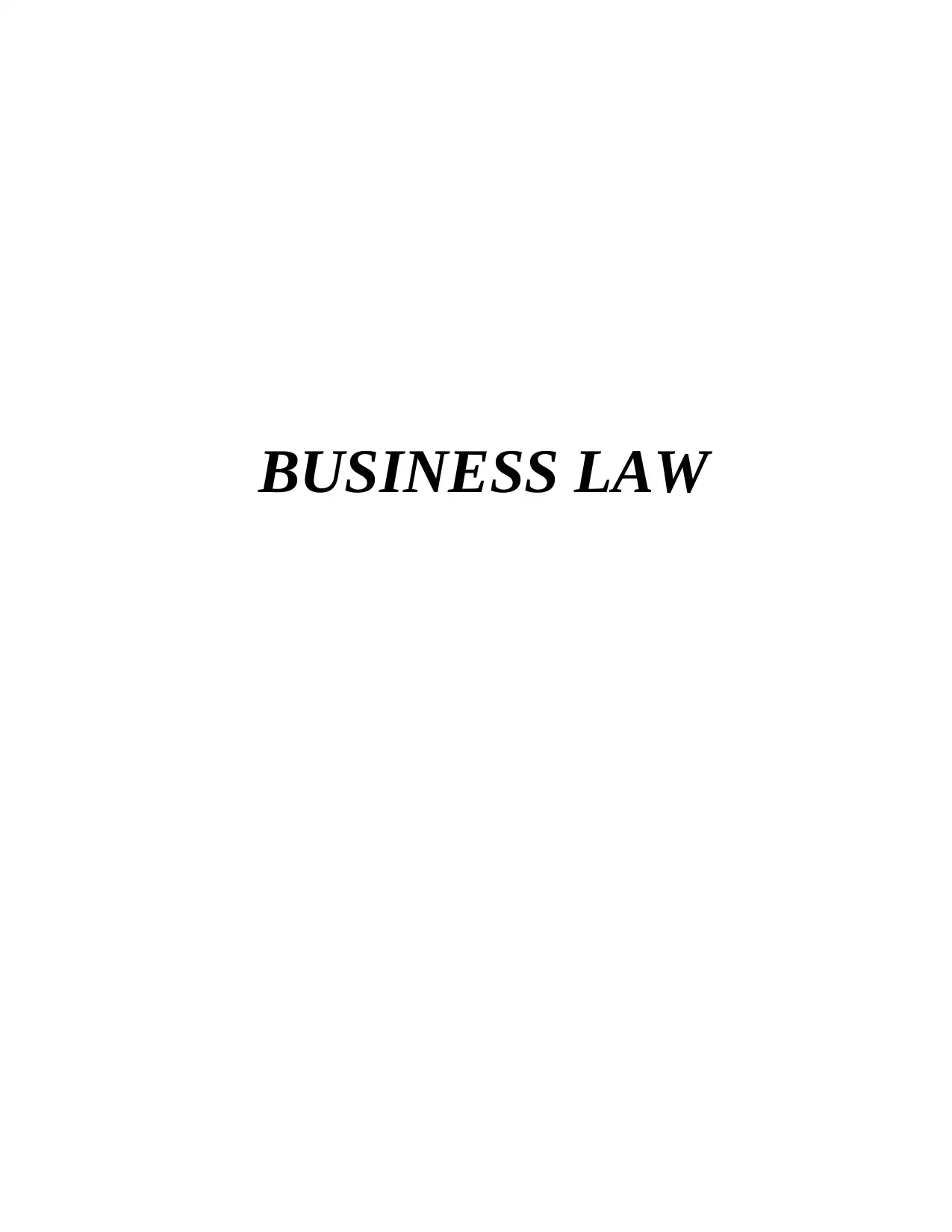
BUSINESS LAW
Paraphrase This Document
Need a fresh take? Get an instant paraphrase of this document with our AI Paraphraser
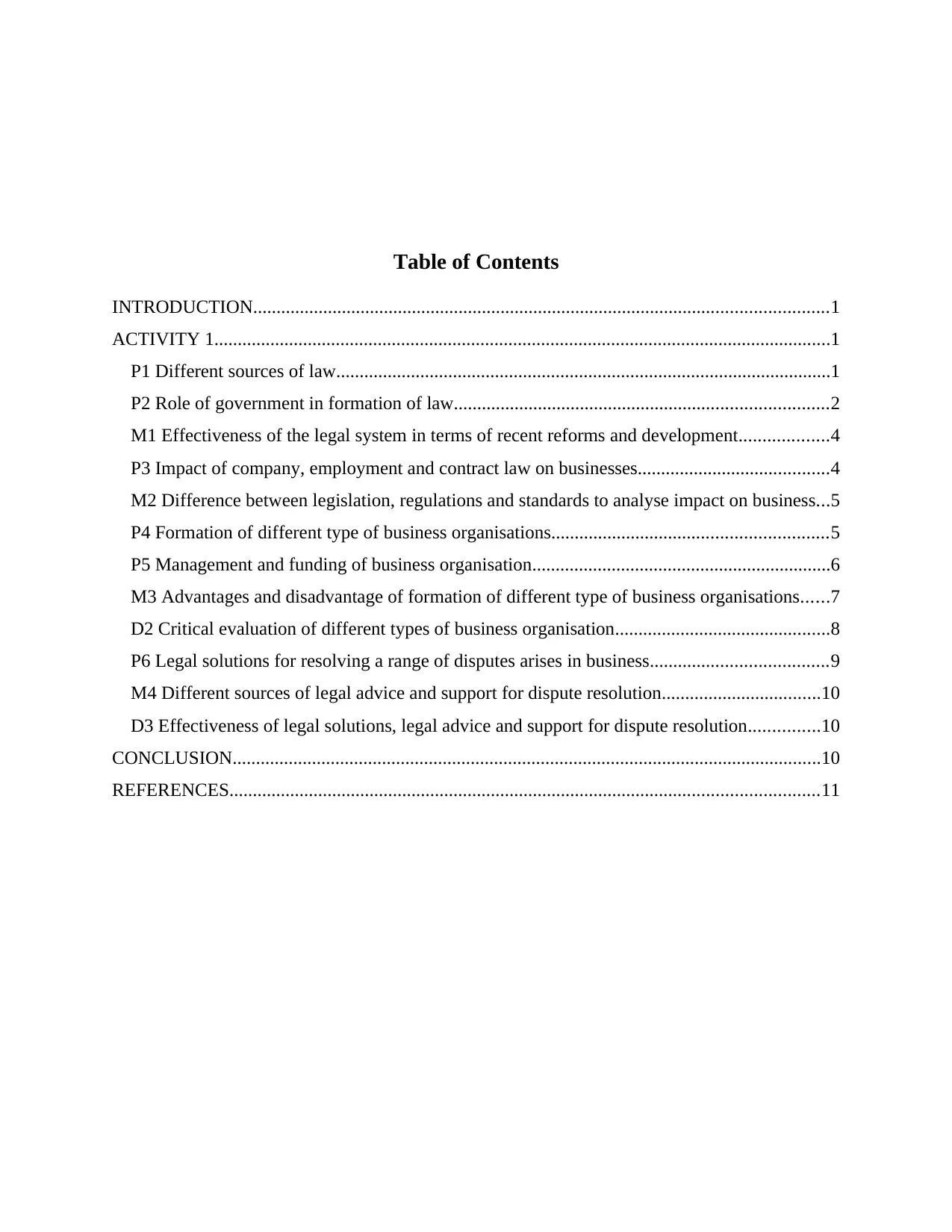
Table of Contents
INTRODUCTION...........................................................................................................................1
ACTIVITY 1....................................................................................................................................1
P1 Different sources of law..........................................................................................................1
P2 Role of government in formation of law................................................................................2
M1 Effectiveness of the legal system in terms of recent reforms and development...................4
P3 Impact of company, employment and contract law on businesses.........................................4
M2 Difference between legislation, regulations and standards to analyse impact on business...5
P4 Formation of different type of business organisations...........................................................5
P5 Management and funding of business organisation................................................................6
M3 Advantages and disadvantage of formation of different type of business organisations......7
D2 Critical evaluation of different types of business organisation..............................................8
P6 Legal solutions for resolving a range of disputes arises in business......................................9
M4 Different sources of legal advice and support for dispute resolution..................................10
D3 Effectiveness of legal solutions, legal advice and support for dispute resolution...............10
CONCLUSION..............................................................................................................................10
REFERENCES..............................................................................................................................11
INTRODUCTION...........................................................................................................................1
ACTIVITY 1....................................................................................................................................1
P1 Different sources of law..........................................................................................................1
P2 Role of government in formation of law................................................................................2
M1 Effectiveness of the legal system in terms of recent reforms and development...................4
P3 Impact of company, employment and contract law on businesses.........................................4
M2 Difference between legislation, regulations and standards to analyse impact on business...5
P4 Formation of different type of business organisations...........................................................5
P5 Management and funding of business organisation................................................................6
M3 Advantages and disadvantage of formation of different type of business organisations......7
D2 Critical evaluation of different types of business organisation..............................................8
P6 Legal solutions for resolving a range of disputes arises in business......................................9
M4 Different sources of legal advice and support for dispute resolution..................................10
D3 Effectiveness of legal solutions, legal advice and support for dispute resolution...............10
CONCLUSION..............................................................................................................................10
REFERENCES..............................................................................................................................11

⊘ This is a preview!⊘
Do you want full access?
Subscribe today to unlock all pages.

Trusted by 1+ million students worldwide
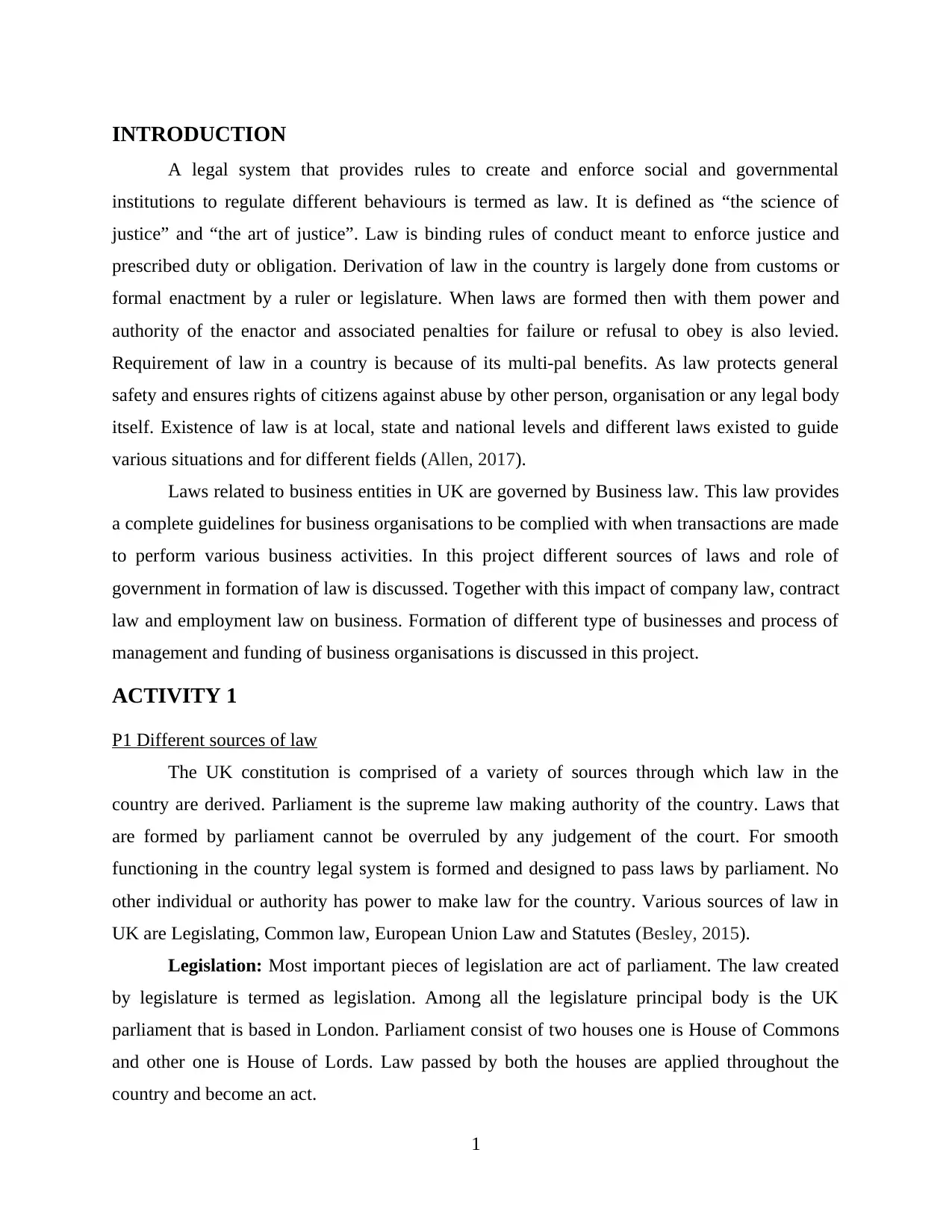
INTRODUCTION
A legal system that provides rules to create and enforce social and governmental
institutions to regulate different behaviours is termed as law. It is defined as “the science of
justice” and “the art of justice”. Law is binding rules of conduct meant to enforce justice and
prescribed duty or obligation. Derivation of law in the country is largely done from customs or
formal enactment by a ruler or legislature. When laws are formed then with them power and
authority of the enactor and associated penalties for failure or refusal to obey is also levied.
Requirement of law in a country is because of its multi-pal benefits. As law protects general
safety and ensures rights of citizens against abuse by other person, organisation or any legal body
itself. Existence of law is at local, state and national levels and different laws existed to guide
various situations and for different fields (Allen, 2017).
Laws related to business entities in UK are governed by Business law. This law provides
a complete guidelines for business organisations to be complied with when transactions are made
to perform various business activities. In this project different sources of laws and role of
government in formation of law is discussed. Together with this impact of company law, contract
law and employment law on business. Formation of different type of businesses and process of
management and funding of business organisations is discussed in this project.
ACTIVITY 1
P1 Different sources of law
The UK constitution is comprised of a variety of sources through which law in the
country are derived. Parliament is the supreme law making authority of the country. Laws that
are formed by parliament cannot be overruled by any judgement of the court. For smooth
functioning in the country legal system is formed and designed to pass laws by parliament. No
other individual or authority has power to make law for the country. Various sources of law in
UK are Legislating, Common law, European Union Law and Statutes (Besley, 2015).
Legislation: Most important pieces of legislation are act of parliament. The law created
by legislature is termed as legislation. Among all the legislature principal body is the UK
parliament that is based in London. Parliament consist of two houses one is House of Commons
and other one is House of Lords. Law passed by both the houses are applied throughout the
country and become an act.
1
A legal system that provides rules to create and enforce social and governmental
institutions to regulate different behaviours is termed as law. It is defined as “the science of
justice” and “the art of justice”. Law is binding rules of conduct meant to enforce justice and
prescribed duty or obligation. Derivation of law in the country is largely done from customs or
formal enactment by a ruler or legislature. When laws are formed then with them power and
authority of the enactor and associated penalties for failure or refusal to obey is also levied.
Requirement of law in a country is because of its multi-pal benefits. As law protects general
safety and ensures rights of citizens against abuse by other person, organisation or any legal body
itself. Existence of law is at local, state and national levels and different laws existed to guide
various situations and for different fields (Allen, 2017).
Laws related to business entities in UK are governed by Business law. This law provides
a complete guidelines for business organisations to be complied with when transactions are made
to perform various business activities. In this project different sources of laws and role of
government in formation of law is discussed. Together with this impact of company law, contract
law and employment law on business. Formation of different type of businesses and process of
management and funding of business organisations is discussed in this project.
ACTIVITY 1
P1 Different sources of law
The UK constitution is comprised of a variety of sources through which law in the
country are derived. Parliament is the supreme law making authority of the country. Laws that
are formed by parliament cannot be overruled by any judgement of the court. For smooth
functioning in the country legal system is formed and designed to pass laws by parliament. No
other individual or authority has power to make law for the country. Various sources of law in
UK are Legislating, Common law, European Union Law and Statutes (Besley, 2015).
Legislation: Most important pieces of legislation are act of parliament. The law created
by legislature is termed as legislation. Among all the legislature principal body is the UK
parliament that is based in London. Parliament consist of two houses one is House of Commons
and other one is House of Lords. Law passed by both the houses are applied throughout the
country and become an act.
1
Paraphrase This Document
Need a fresh take? Get an instant paraphrase of this document with our AI Paraphraser
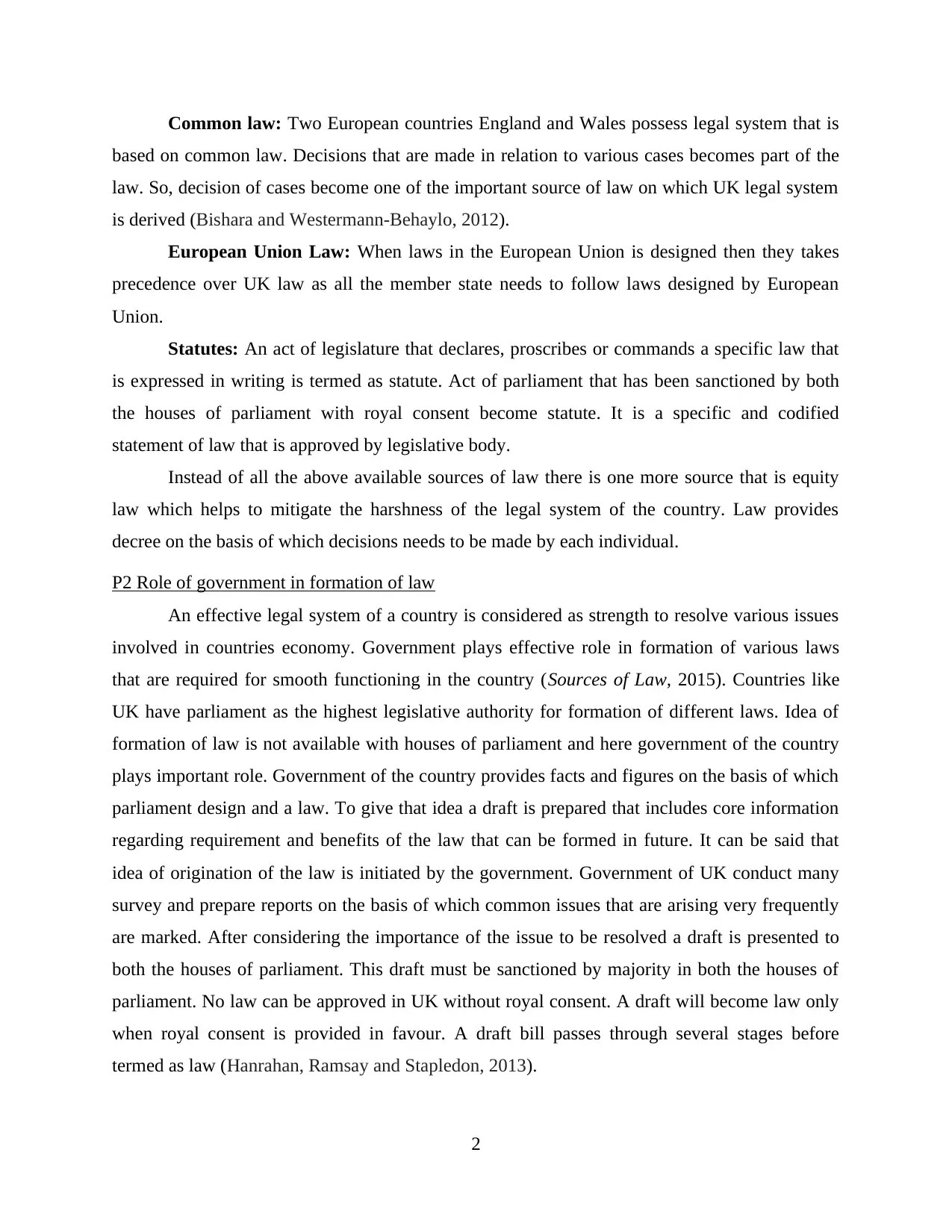
Common law: Two European countries England and Wales possess legal system that is
based on common law. Decisions that are made in relation to various cases becomes part of the
law. So, decision of cases become one of the important source of law on which UK legal system
is derived (Bishara and Westermann‐Behaylo, 2012).
European Union Law: When laws in the European Union is designed then they takes
precedence over UK law as all the member state needs to follow laws designed by European
Union.
Statutes: An act of legislature that declares, proscribes or commands a specific law that
is expressed in writing is termed as statute. Act of parliament that has been sanctioned by both
the houses of parliament with royal consent become statute. It is a specific and codified
statement of law that is approved by legislative body.
Instead of all the above available sources of law there is one more source that is equity
law which helps to mitigate the harshness of the legal system of the country. Law provides
decree on the basis of which decisions needs to be made by each individual.
P2 Role of government in formation of law
An effective legal system of a country is considered as strength to resolve various issues
involved in countries economy. Government plays effective role in formation of various laws
that are required for smooth functioning in the country (Sources of Law, 2015). Countries like
UK have parliament as the highest legislative authority for formation of different laws. Idea of
formation of law is not available with houses of parliament and here government of the country
plays important role. Government of the country provides facts and figures on the basis of which
parliament design and a law. To give that idea a draft is prepared that includes core information
regarding requirement and benefits of the law that can be formed in future. It can be said that
idea of origination of the law is initiated by the government. Government of UK conduct many
survey and prepare reports on the basis of which common issues that are arising very frequently
are marked. After considering the importance of the issue to be resolved a draft is presented to
both the houses of parliament. This draft must be sanctioned by majority in both the houses of
parliament. No law can be approved in UK without royal consent. A draft will become law only
when royal consent is provided in favour. A draft bill passes through several stages before
termed as law (Hanrahan, Ramsay and Stapledon, 2013).
2
based on common law. Decisions that are made in relation to various cases becomes part of the
law. So, decision of cases become one of the important source of law on which UK legal system
is derived (Bishara and Westermann‐Behaylo, 2012).
European Union Law: When laws in the European Union is designed then they takes
precedence over UK law as all the member state needs to follow laws designed by European
Union.
Statutes: An act of legislature that declares, proscribes or commands a specific law that
is expressed in writing is termed as statute. Act of parliament that has been sanctioned by both
the houses of parliament with royal consent become statute. It is a specific and codified
statement of law that is approved by legislative body.
Instead of all the above available sources of law there is one more source that is equity
law which helps to mitigate the harshness of the legal system of the country. Law provides
decree on the basis of which decisions needs to be made by each individual.
P2 Role of government in formation of law
An effective legal system of a country is considered as strength to resolve various issues
involved in countries economy. Government plays effective role in formation of various laws
that are required for smooth functioning in the country (Sources of Law, 2015). Countries like
UK have parliament as the highest legislative authority for formation of different laws. Idea of
formation of law is not available with houses of parliament and here government of the country
plays important role. Government of the country provides facts and figures on the basis of which
parliament design and a law. To give that idea a draft is prepared that includes core information
regarding requirement and benefits of the law that can be formed in future. It can be said that
idea of origination of the law is initiated by the government. Government of UK conduct many
survey and prepare reports on the basis of which common issues that are arising very frequently
are marked. After considering the importance of the issue to be resolved a draft is presented to
both the houses of parliament. This draft must be sanctioned by majority in both the houses of
parliament. No law can be approved in UK without royal consent. A draft will become law only
when royal consent is provided in favour. A draft bill passes through several stages before
termed as law (Hanrahan, Ramsay and Stapledon, 2013).
2
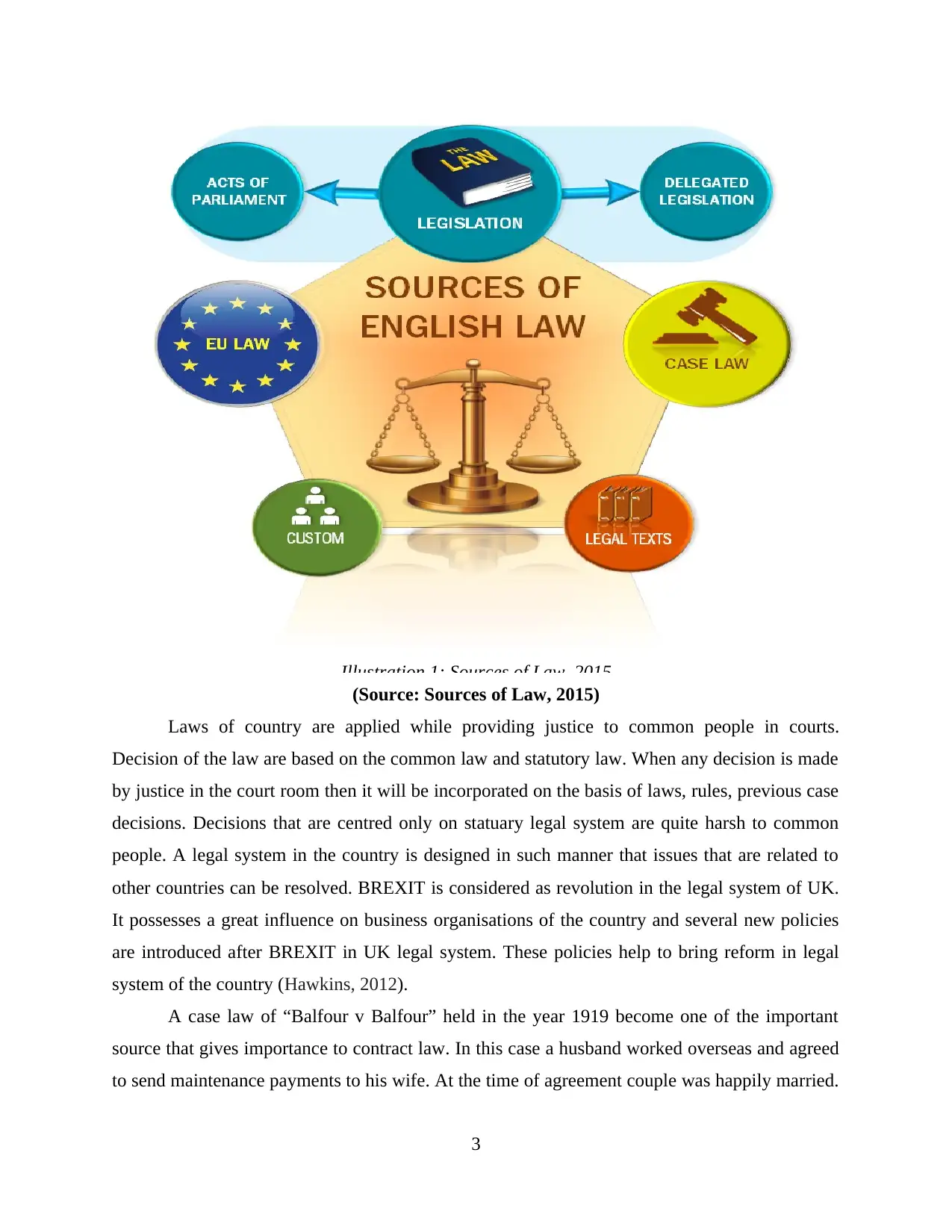
(Source: Sources of Law, 2015)
Laws of country are applied while providing justice to common people in courts.
Decision of the law are based on the common law and statutory law. When any decision is made
by justice in the court room then it will be incorporated on the basis of laws, rules, previous case
decisions. Decisions that are centred only on statuary legal system are quite harsh to common
people. A legal system in the country is designed in such manner that issues that are related to
other countries can be resolved. BREXIT is considered as revolution in the legal system of UK.
It possesses a great influence on business organisations of the country and several new policies
are introduced after BREXIT in UK legal system. These policies help to bring reform in legal
system of the country (Hawkins, 2012).
A case law of “Balfour v Balfour” held in the year 1919 become one of the important
source that gives importance to contract law. In this case a husband worked overseas and agreed
to send maintenance payments to his wife. At the time of agreement couple was happily married.
3
Illustration 1: Sources of Law, 2015
Laws of country are applied while providing justice to common people in courts.
Decision of the law are based on the common law and statutory law. When any decision is made
by justice in the court room then it will be incorporated on the basis of laws, rules, previous case
decisions. Decisions that are centred only on statuary legal system are quite harsh to common
people. A legal system in the country is designed in such manner that issues that are related to
other countries can be resolved. BREXIT is considered as revolution in the legal system of UK.
It possesses a great influence on business organisations of the country and several new policies
are introduced after BREXIT in UK legal system. These policies help to bring reform in legal
system of the country (Hawkins, 2012).
A case law of “Balfour v Balfour” held in the year 1919 become one of the important
source that gives importance to contract law. In this case a husband worked overseas and agreed
to send maintenance payments to his wife. At the time of agreement couple was happily married.
3
Illustration 1: Sources of Law, 2015
⊘ This is a preview!⊘
Do you want full access?
Subscribe today to unlock all pages.

Trusted by 1+ million students worldwide
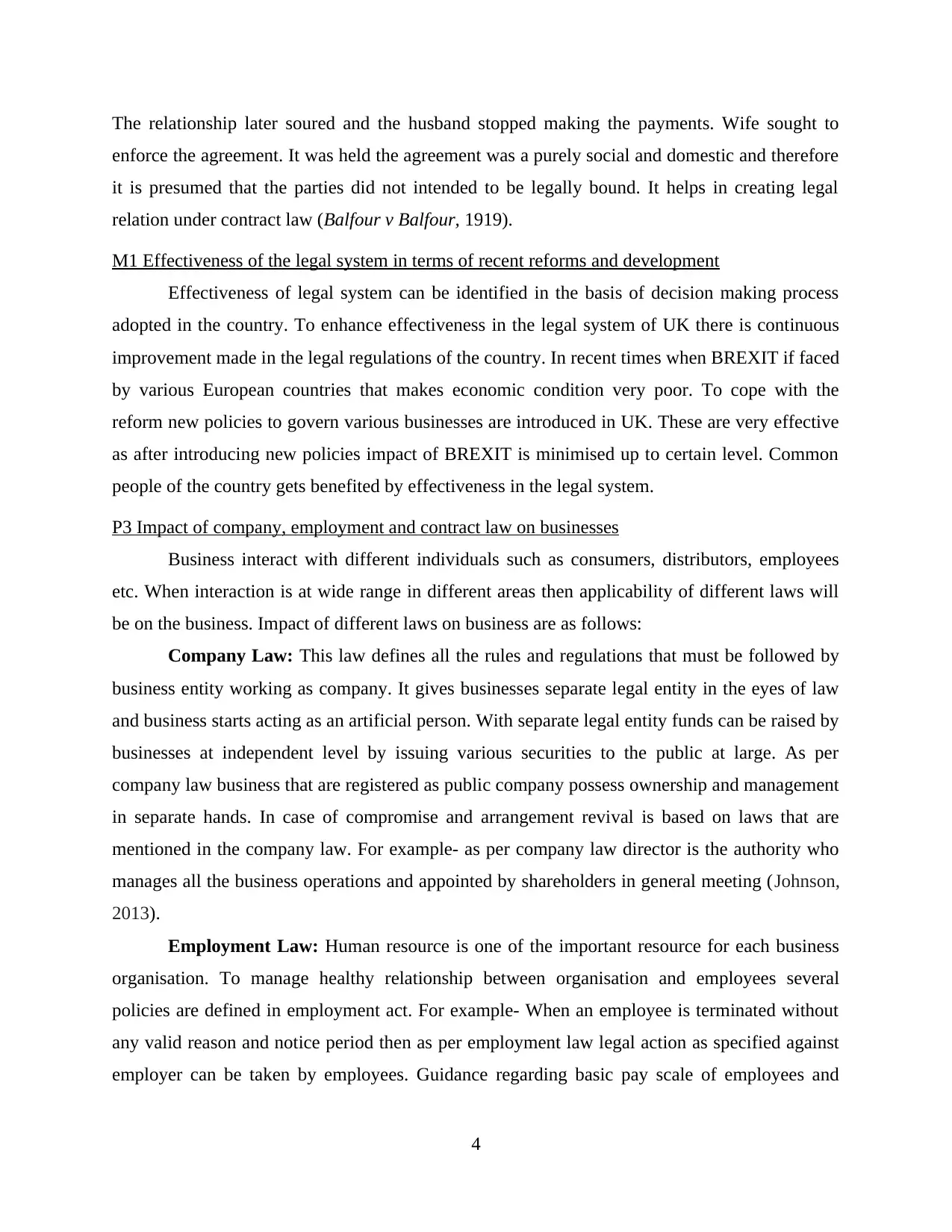
The relationship later soured and the husband stopped making the payments. Wife sought to
enforce the agreement. It was held the agreement was a purely social and domestic and therefore
it is presumed that the parties did not intended to be legally bound. It helps in creating legal
relation under contract law (Balfour v Balfour, 1919).
M1 Effectiveness of the legal system in terms of recent reforms and development
Effectiveness of legal system can be identified in the basis of decision making process
adopted in the country. To enhance effectiveness in the legal system of UK there is continuous
improvement made in the legal regulations of the country. In recent times when BREXIT if faced
by various European countries that makes economic condition very poor. To cope with the
reform new policies to govern various businesses are introduced in UK. These are very effective
as after introducing new policies impact of BREXIT is minimised up to certain level. Common
people of the country gets benefited by effectiveness in the legal system.
P3 Impact of company, employment and contract law on businesses
Business interact with different individuals such as consumers, distributors, employees
etc. When interaction is at wide range in different areas then applicability of different laws will
be on the business. Impact of different laws on business are as follows:
Company Law: This law defines all the rules and regulations that must be followed by
business entity working as company. It gives businesses separate legal entity in the eyes of law
and business starts acting as an artificial person. With separate legal entity funds can be raised by
businesses at independent level by issuing various securities to the public at large. As per
company law business that are registered as public company possess ownership and management
in separate hands. In case of compromise and arrangement revival is based on laws that are
mentioned in the company law. For example- as per company law director is the authority who
manages all the business operations and appointed by shareholders in general meeting (Johnson,
2013).
Employment Law: Human resource is one of the important resource for each business
organisation. To manage healthy relationship between organisation and employees several
policies are defined in employment act. For example- When an employee is terminated without
any valid reason and notice period then as per employment law legal action as specified against
employer can be taken by employees. Guidance regarding basic pay scale of employees and
4
enforce the agreement. It was held the agreement was a purely social and domestic and therefore
it is presumed that the parties did not intended to be legally bound. It helps in creating legal
relation under contract law (Balfour v Balfour, 1919).
M1 Effectiveness of the legal system in terms of recent reforms and development
Effectiveness of legal system can be identified in the basis of decision making process
adopted in the country. To enhance effectiveness in the legal system of UK there is continuous
improvement made in the legal regulations of the country. In recent times when BREXIT if faced
by various European countries that makes economic condition very poor. To cope with the
reform new policies to govern various businesses are introduced in UK. These are very effective
as after introducing new policies impact of BREXIT is minimised up to certain level. Common
people of the country gets benefited by effectiveness in the legal system.
P3 Impact of company, employment and contract law on businesses
Business interact with different individuals such as consumers, distributors, employees
etc. When interaction is at wide range in different areas then applicability of different laws will
be on the business. Impact of different laws on business are as follows:
Company Law: This law defines all the rules and regulations that must be followed by
business entity working as company. It gives businesses separate legal entity in the eyes of law
and business starts acting as an artificial person. With separate legal entity funds can be raised by
businesses at independent level by issuing various securities to the public at large. As per
company law business that are registered as public company possess ownership and management
in separate hands. In case of compromise and arrangement revival is based on laws that are
mentioned in the company law. For example- as per company law director is the authority who
manages all the business operations and appointed by shareholders in general meeting (Johnson,
2013).
Employment Law: Human resource is one of the important resource for each business
organisation. To manage healthy relationship between organisation and employees several
policies are defined in employment act. For example- When an employee is terminated without
any valid reason and notice period then as per employment law legal action as specified against
employer can be taken by employees. Guidance regarding basic pay scale of employees and
4
Paraphrase This Document
Need a fresh take? Get an instant paraphrase of this document with our AI Paraphraser
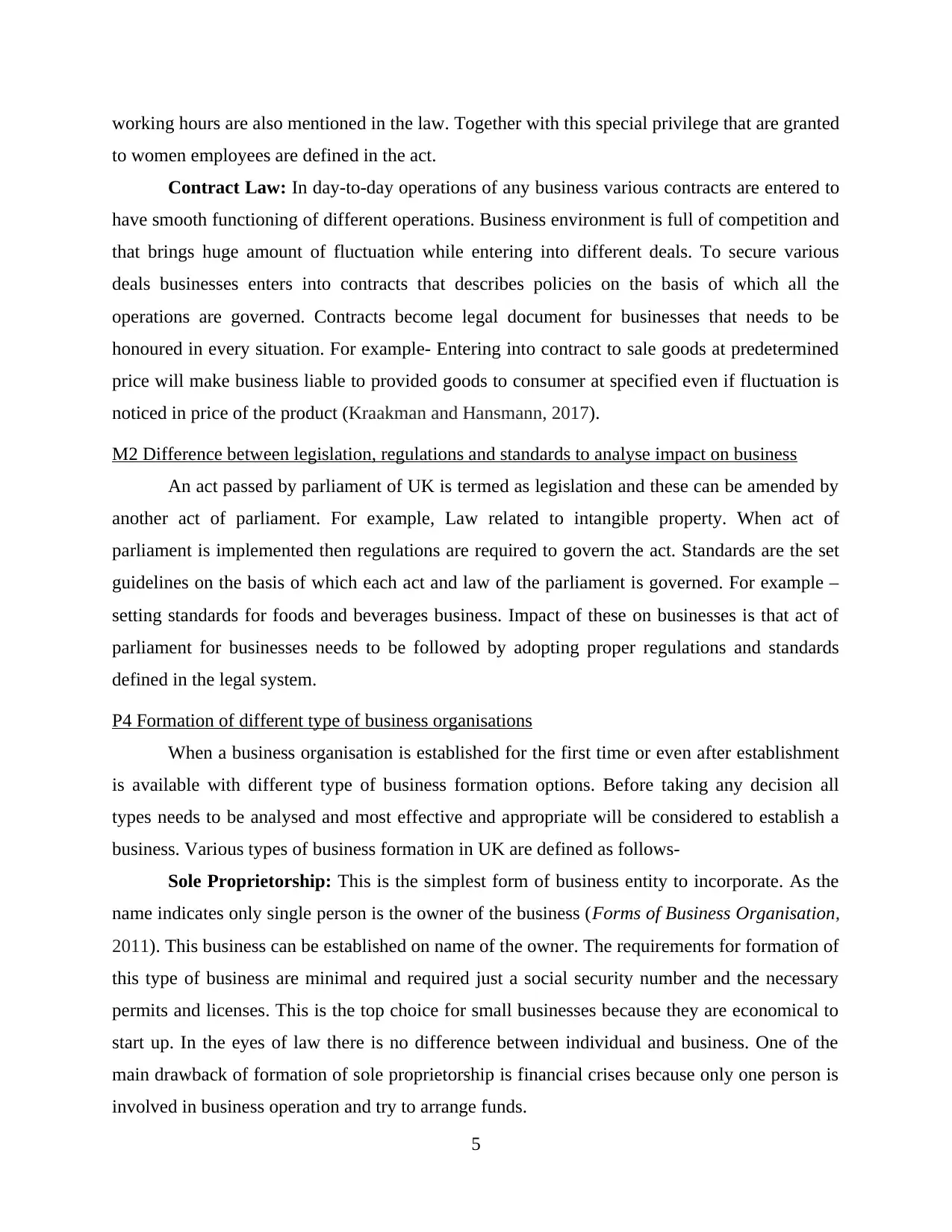
working hours are also mentioned in the law. Together with this special privilege that are granted
to women employees are defined in the act.
Contract Law: In day-to-day operations of any business various contracts are entered to
have smooth functioning of different operations. Business environment is full of competition and
that brings huge amount of fluctuation while entering into different deals. To secure various
deals businesses enters into contracts that describes policies on the basis of which all the
operations are governed. Contracts become legal document for businesses that needs to be
honoured in every situation. For example- Entering into contract to sale goods at predetermined
price will make business liable to provided goods to consumer at specified even if fluctuation is
noticed in price of the product (Kraakman and Hansmann, 2017).
M2 Difference between legislation, regulations and standards to analyse impact on business
An act passed by parliament of UK is termed as legislation and these can be amended by
another act of parliament. For example, Law related to intangible property. When act of
parliament is implemented then regulations are required to govern the act. Standards are the set
guidelines on the basis of which each act and law of the parliament is governed. For example –
setting standards for foods and beverages business. Impact of these on businesses is that act of
parliament for businesses needs to be followed by adopting proper regulations and standards
defined in the legal system.
P4 Formation of different type of business organisations
When a business organisation is established for the first time or even after establishment
is available with different type of business formation options. Before taking any decision all
types needs to be analysed and most effective and appropriate will be considered to establish a
business. Various types of business formation in UK are defined as follows-
Sole Proprietorship: This is the simplest form of business entity to incorporate. As the
name indicates only single person is the owner of the business (Forms of Business Organisation,
2011). This business can be established on name of the owner. The requirements for formation of
this type of business are minimal and required just a social security number and the necessary
permits and licenses. This is the top choice for small businesses because they are economical to
start up. In the eyes of law there is no difference between individual and business. One of the
main drawback of formation of sole proprietorship is financial crises because only one person is
involved in business operation and try to arrange funds.
5
to women employees are defined in the act.
Contract Law: In day-to-day operations of any business various contracts are entered to
have smooth functioning of different operations. Business environment is full of competition and
that brings huge amount of fluctuation while entering into different deals. To secure various
deals businesses enters into contracts that describes policies on the basis of which all the
operations are governed. Contracts become legal document for businesses that needs to be
honoured in every situation. For example- Entering into contract to sale goods at predetermined
price will make business liable to provided goods to consumer at specified even if fluctuation is
noticed in price of the product (Kraakman and Hansmann, 2017).
M2 Difference between legislation, regulations and standards to analyse impact on business
An act passed by parliament of UK is termed as legislation and these can be amended by
another act of parliament. For example, Law related to intangible property. When act of
parliament is implemented then regulations are required to govern the act. Standards are the set
guidelines on the basis of which each act and law of the parliament is governed. For example –
setting standards for foods and beverages business. Impact of these on businesses is that act of
parliament for businesses needs to be followed by adopting proper regulations and standards
defined in the legal system.
P4 Formation of different type of business organisations
When a business organisation is established for the first time or even after establishment
is available with different type of business formation options. Before taking any decision all
types needs to be analysed and most effective and appropriate will be considered to establish a
business. Various types of business formation in UK are defined as follows-
Sole Proprietorship: This is the simplest form of business entity to incorporate. As the
name indicates only single person is the owner of the business (Forms of Business Organisation,
2011). This business can be established on name of the owner. The requirements for formation of
this type of business are minimal and required just a social security number and the necessary
permits and licenses. This is the top choice for small businesses because they are economical to
start up. In the eyes of law there is no difference between individual and business. One of the
main drawback of formation of sole proprietorship is financial crises because only one person is
involved in business operation and try to arrange funds.
5
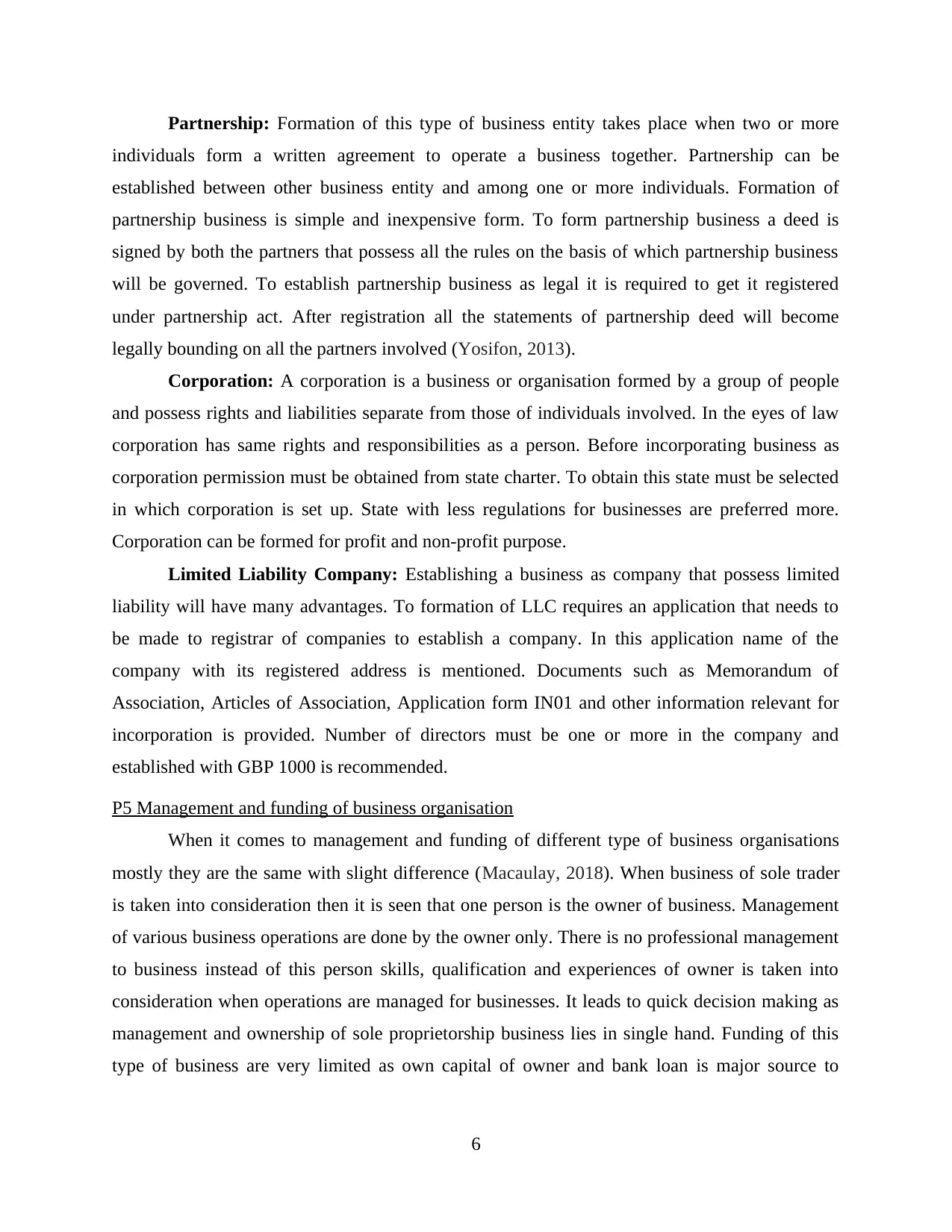
Partnership: Formation of this type of business entity takes place when two or more
individuals form a written agreement to operate a business together. Partnership can be
established between other business entity and among one or more individuals. Formation of
partnership business is simple and inexpensive form. To form partnership business a deed is
signed by both the partners that possess all the rules on the basis of which partnership business
will be governed. To establish partnership business as legal it is required to get it registered
under partnership act. After registration all the statements of partnership deed will become
legally bounding on all the partners involved (Yosifon, 2013).
Corporation: A corporation is a business or organisation formed by a group of people
and possess rights and liabilities separate from those of individuals involved. In the eyes of law
corporation has same rights and responsibilities as a person. Before incorporating business as
corporation permission must be obtained from state charter. To obtain this state must be selected
in which corporation is set up. State with less regulations for businesses are preferred more.
Corporation can be formed for profit and non-profit purpose.
Limited Liability Company: Establishing a business as company that possess limited
liability will have many advantages. To formation of LLC requires an application that needs to
be made to registrar of companies to establish a company. In this application name of the
company with its registered address is mentioned. Documents such as Memorandum of
Association, Articles of Association, Application form IN01 and other information relevant for
incorporation is provided. Number of directors must be one or more in the company and
established with GBP 1000 is recommended.
P5 Management and funding of business organisation
When it comes to management and funding of different type of business organisations
mostly they are the same with slight difference (Macaulay, 2018). When business of sole trader
is taken into consideration then it is seen that one person is the owner of business. Management
of various business operations are done by the owner only. There is no professional management
to business instead of this person skills, qualification and experiences of owner is taken into
consideration when operations are managed for businesses. It leads to quick decision making as
management and ownership of sole proprietorship business lies in single hand. Funding of this
type of business are very limited as own capital of owner and bank loan is major source to
6
individuals form a written agreement to operate a business together. Partnership can be
established between other business entity and among one or more individuals. Formation of
partnership business is simple and inexpensive form. To form partnership business a deed is
signed by both the partners that possess all the rules on the basis of which partnership business
will be governed. To establish partnership business as legal it is required to get it registered
under partnership act. After registration all the statements of partnership deed will become
legally bounding on all the partners involved (Yosifon, 2013).
Corporation: A corporation is a business or organisation formed by a group of people
and possess rights and liabilities separate from those of individuals involved. In the eyes of law
corporation has same rights and responsibilities as a person. Before incorporating business as
corporation permission must be obtained from state charter. To obtain this state must be selected
in which corporation is set up. State with less regulations for businesses are preferred more.
Corporation can be formed for profit and non-profit purpose.
Limited Liability Company: Establishing a business as company that possess limited
liability will have many advantages. To formation of LLC requires an application that needs to
be made to registrar of companies to establish a company. In this application name of the
company with its registered address is mentioned. Documents such as Memorandum of
Association, Articles of Association, Application form IN01 and other information relevant for
incorporation is provided. Number of directors must be one or more in the company and
established with GBP 1000 is recommended.
P5 Management and funding of business organisation
When it comes to management and funding of different type of business organisations
mostly they are the same with slight difference (Macaulay, 2018). When business of sole trader
is taken into consideration then it is seen that one person is the owner of business. Management
of various business operations are done by the owner only. There is no professional management
to business instead of this person skills, qualification and experiences of owner is taken into
consideration when operations are managed for businesses. It leads to quick decision making as
management and ownership of sole proprietorship business lies in single hand. Funding of this
type of business are very limited as own capital of owner and bank loan is major source to
6
⊘ This is a preview!⊘
Do you want full access?
Subscribe today to unlock all pages.

Trusted by 1+ million students worldwide
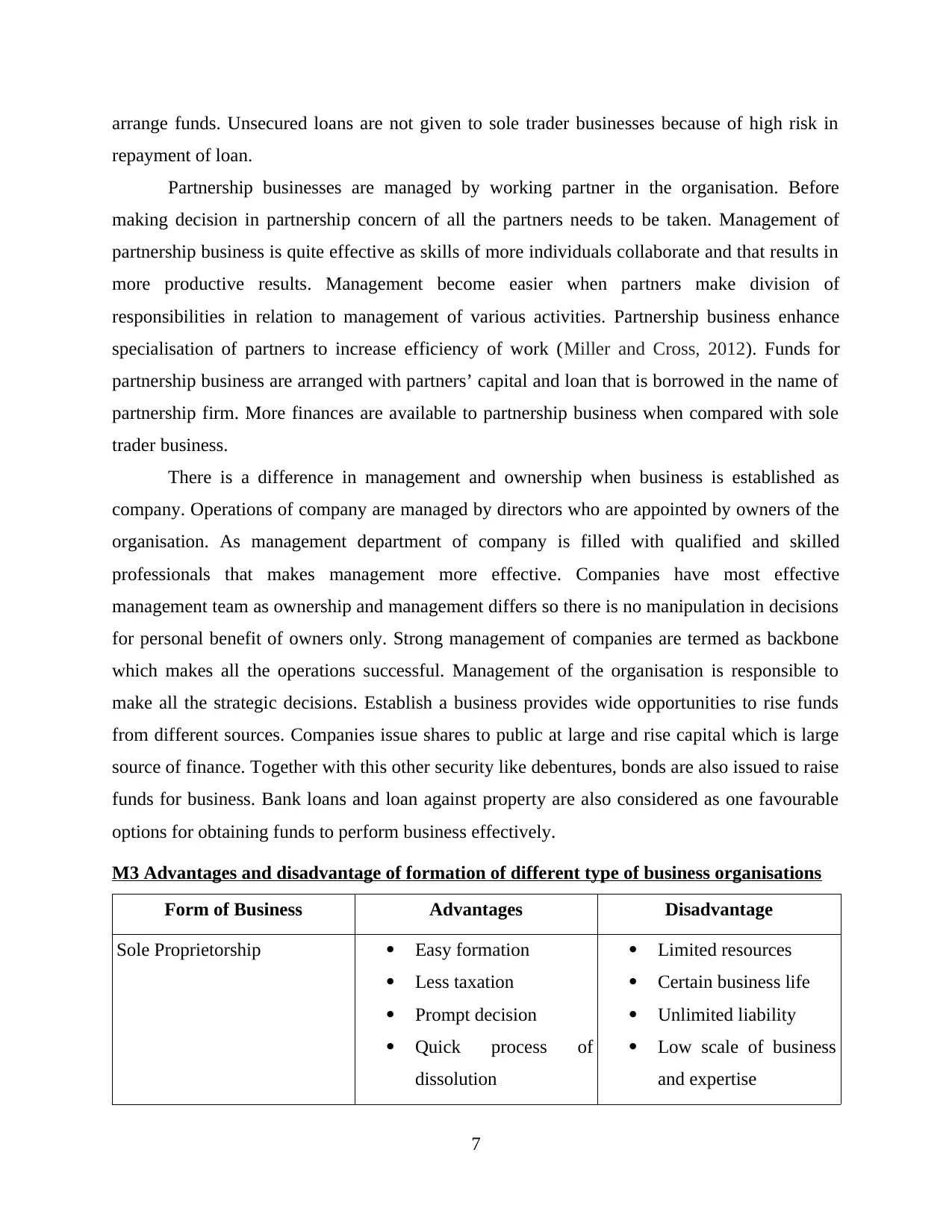
arrange funds. Unsecured loans are not given to sole trader businesses because of high risk in
repayment of loan.
Partnership businesses are managed by working partner in the organisation. Before
making decision in partnership concern of all the partners needs to be taken. Management of
partnership business is quite effective as skills of more individuals collaborate and that results in
more productive results. Management become easier when partners make division of
responsibilities in relation to management of various activities. Partnership business enhance
specialisation of partners to increase efficiency of work (Miller and Cross, 2012). Funds for
partnership business are arranged with partners’ capital and loan that is borrowed in the name of
partnership firm. More finances are available to partnership business when compared with sole
trader business.
There is a difference in management and ownership when business is established as
company. Operations of company are managed by directors who are appointed by owners of the
organisation. As management department of company is filled with qualified and skilled
professionals that makes management more effective. Companies have most effective
management team as ownership and management differs so there is no manipulation in decisions
for personal benefit of owners only. Strong management of companies are termed as backbone
which makes all the operations successful. Management of the organisation is responsible to
make all the strategic decisions. Establish a business provides wide opportunities to rise funds
from different sources. Companies issue shares to public at large and rise capital which is large
source of finance. Together with this other security like debentures, bonds are also issued to raise
funds for business. Bank loans and loan against property are also considered as one favourable
options for obtaining funds to perform business effectively.
M3 Advantages and disadvantage of formation of different type of business organisations
Form of Business Advantages Disadvantage
Sole Proprietorship Easy formation
Less taxation
Prompt decision
Quick process of
dissolution
Limited resources
Certain business life
Unlimited liability
Low scale of business
and expertise
7
repayment of loan.
Partnership businesses are managed by working partner in the organisation. Before
making decision in partnership concern of all the partners needs to be taken. Management of
partnership business is quite effective as skills of more individuals collaborate and that results in
more productive results. Management become easier when partners make division of
responsibilities in relation to management of various activities. Partnership business enhance
specialisation of partners to increase efficiency of work (Miller and Cross, 2012). Funds for
partnership business are arranged with partners’ capital and loan that is borrowed in the name of
partnership firm. More finances are available to partnership business when compared with sole
trader business.
There is a difference in management and ownership when business is established as
company. Operations of company are managed by directors who are appointed by owners of the
organisation. As management department of company is filled with qualified and skilled
professionals that makes management more effective. Companies have most effective
management team as ownership and management differs so there is no manipulation in decisions
for personal benefit of owners only. Strong management of companies are termed as backbone
which makes all the operations successful. Management of the organisation is responsible to
make all the strategic decisions. Establish a business provides wide opportunities to rise funds
from different sources. Companies issue shares to public at large and rise capital which is large
source of finance. Together with this other security like debentures, bonds are also issued to raise
funds for business. Bank loans and loan against property are also considered as one favourable
options for obtaining funds to perform business effectively.
M3 Advantages and disadvantage of formation of different type of business organisations
Form of Business Advantages Disadvantage
Sole Proprietorship Easy formation
Less taxation
Prompt decision
Quick process of
dissolution
Limited resources
Certain business life
Unlimited liability
Low scale of business
and expertise
7
Paraphrase This Document
Need a fresh take? Get an instant paraphrase of this document with our AI Paraphraser
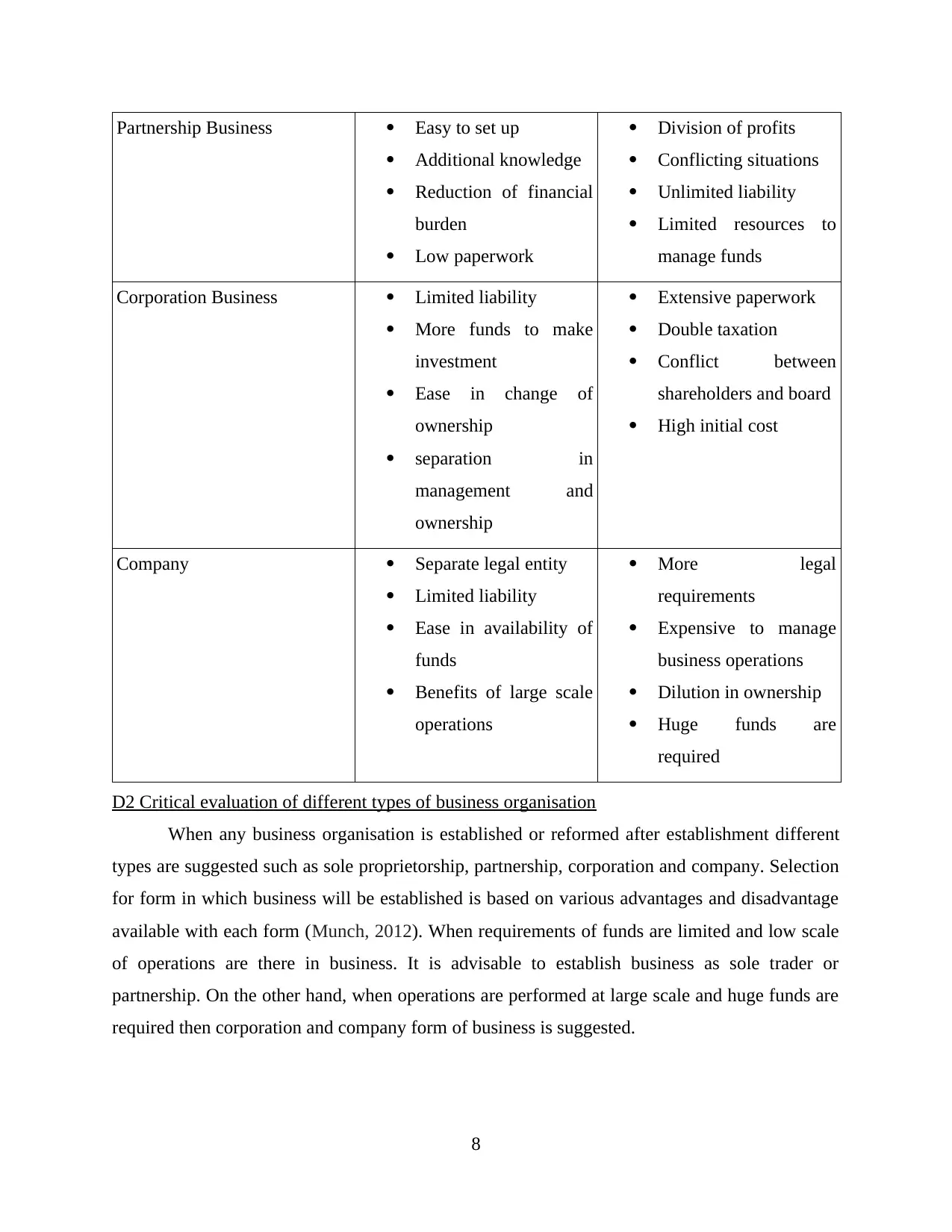
Partnership Business Easy to set up
Additional knowledge
Reduction of financial
burden
Low paperwork
Division of profits
Conflicting situations
Unlimited liability
Limited resources to
manage funds
Corporation Business Limited liability
More funds to make
investment
Ease in change of
ownership
separation in
management and
ownership
Extensive paperwork
Double taxation
Conflict between
shareholders and board
High initial cost
Company Separate legal entity
Limited liability
Ease in availability of
funds
Benefits of large scale
operations
More legal
requirements
Expensive to manage
business operations
Dilution in ownership
Huge funds are
required
D2 Critical evaluation of different types of business organisation
When any business organisation is established or reformed after establishment different
types are suggested such as sole proprietorship, partnership, corporation and company. Selection
for form in which business will be established is based on various advantages and disadvantage
available with each form (Munch, 2012). When requirements of funds are limited and low scale
of operations are there in business. It is advisable to establish business as sole trader or
partnership. On the other hand, when operations are performed at large scale and huge funds are
required then corporation and company form of business is suggested.
8
Additional knowledge
Reduction of financial
burden
Low paperwork
Division of profits
Conflicting situations
Unlimited liability
Limited resources to
manage funds
Corporation Business Limited liability
More funds to make
investment
Ease in change of
ownership
separation in
management and
ownership
Extensive paperwork
Double taxation
Conflict between
shareholders and board
High initial cost
Company Separate legal entity
Limited liability
Ease in availability of
funds
Benefits of large scale
operations
More legal
requirements
Expensive to manage
business operations
Dilution in ownership
Huge funds are
required
D2 Critical evaluation of different types of business organisation
When any business organisation is established or reformed after establishment different
types are suggested such as sole proprietorship, partnership, corporation and company. Selection
for form in which business will be established is based on various advantages and disadvantage
available with each form (Munch, 2012). When requirements of funds are limited and low scale
of operations are there in business. It is advisable to establish business as sole trader or
partnership. On the other hand, when operations are performed at large scale and huge funds are
required then corporation and company form of business is suggested.
8
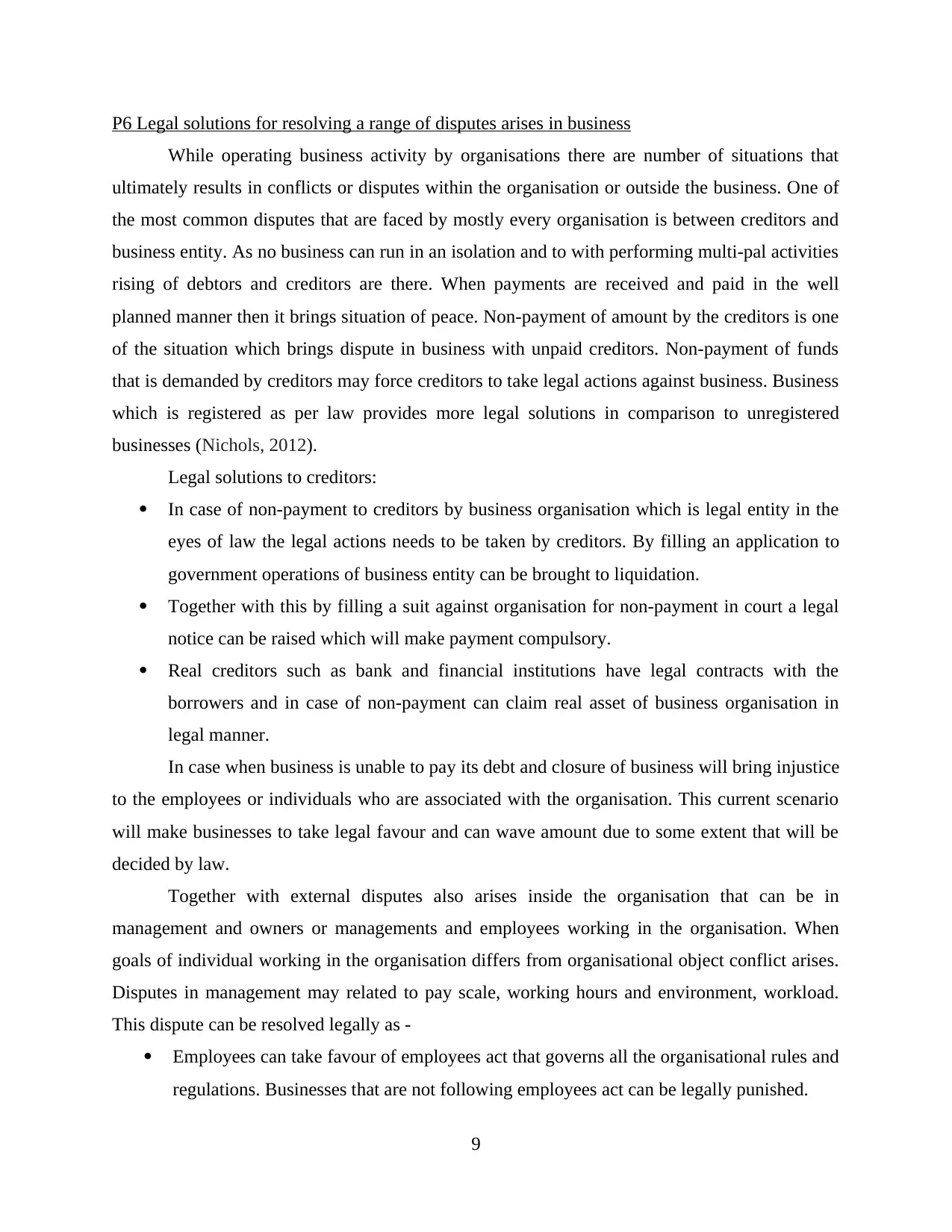
P6 Legal solutions for resolving a range of disputes arises in business
While operating business activity by organisations there are number of situations that
ultimately results in conflicts or disputes within the organisation or outside the business. One of
the most common disputes that are faced by mostly every organisation is between creditors and
business entity. As no business can run in an isolation and to with performing multi-pal activities
rising of debtors and creditors are there. When payments are received and paid in the well
planned manner then it brings situation of peace. Non-payment of amount by the creditors is one
of the situation which brings dispute in business with unpaid creditors. Non-payment of funds
that is demanded by creditors may force creditors to take legal actions against business. Business
which is registered as per law provides more legal solutions in comparison to unregistered
businesses (Nichols, 2012).
Legal solutions to creditors:
In case of non-payment to creditors by business organisation which is legal entity in the
eyes of law the legal actions needs to be taken by creditors. By filling an application to
government operations of business entity can be brought to liquidation.
Together with this by filling a suit against organisation for non-payment in court a legal
notice can be raised which will make payment compulsory.
Real creditors such as bank and financial institutions have legal contracts with the
borrowers and in case of non-payment can claim real asset of business organisation in
legal manner.
In case when business is unable to pay its debt and closure of business will bring injustice
to the employees or individuals who are associated with the organisation. This current scenario
will make businesses to take legal favour and can wave amount due to some extent that will be
decided by law.
Together with external disputes also arises inside the organisation that can be in
management and owners or managements and employees working in the organisation. When
goals of individual working in the organisation differs from organisational object conflict arises.
Disputes in management may related to pay scale, working hours and environment, workload.
This dispute can be resolved legally as -
Employees can take favour of employees act that governs all the organisational rules and
regulations. Businesses that are not following employees act can be legally punished.
9
While operating business activity by organisations there are number of situations that
ultimately results in conflicts or disputes within the organisation or outside the business. One of
the most common disputes that are faced by mostly every organisation is between creditors and
business entity. As no business can run in an isolation and to with performing multi-pal activities
rising of debtors and creditors are there. When payments are received and paid in the well
planned manner then it brings situation of peace. Non-payment of amount by the creditors is one
of the situation which brings dispute in business with unpaid creditors. Non-payment of funds
that is demanded by creditors may force creditors to take legal actions against business. Business
which is registered as per law provides more legal solutions in comparison to unregistered
businesses (Nichols, 2012).
Legal solutions to creditors:
In case of non-payment to creditors by business organisation which is legal entity in the
eyes of law the legal actions needs to be taken by creditors. By filling an application to
government operations of business entity can be brought to liquidation.
Together with this by filling a suit against organisation for non-payment in court a legal
notice can be raised which will make payment compulsory.
Real creditors such as bank and financial institutions have legal contracts with the
borrowers and in case of non-payment can claim real asset of business organisation in
legal manner.
In case when business is unable to pay its debt and closure of business will bring injustice
to the employees or individuals who are associated with the organisation. This current scenario
will make businesses to take legal favour and can wave amount due to some extent that will be
decided by law.
Together with external disputes also arises inside the organisation that can be in
management and owners or managements and employees working in the organisation. When
goals of individual working in the organisation differs from organisational object conflict arises.
Disputes in management may related to pay scale, working hours and environment, workload.
This dispute can be resolved legally as -
Employees can take favour of employees act that governs all the organisational rules and
regulations. Businesses that are not following employees act can be legally punished.
9
⊘ This is a preview!⊘
Do you want full access?
Subscribe today to unlock all pages.

Trusted by 1+ million students worldwide
1 out of 14
Related Documents
Your All-in-One AI-Powered Toolkit for Academic Success.
+13062052269
info@desklib.com
Available 24*7 on WhatsApp / Email
![[object Object]](/_next/static/media/star-bottom.7253800d.svg)
Unlock your academic potential
Copyright © 2020–2026 A2Z Services. All Rights Reserved. Developed and managed by ZUCOL.




